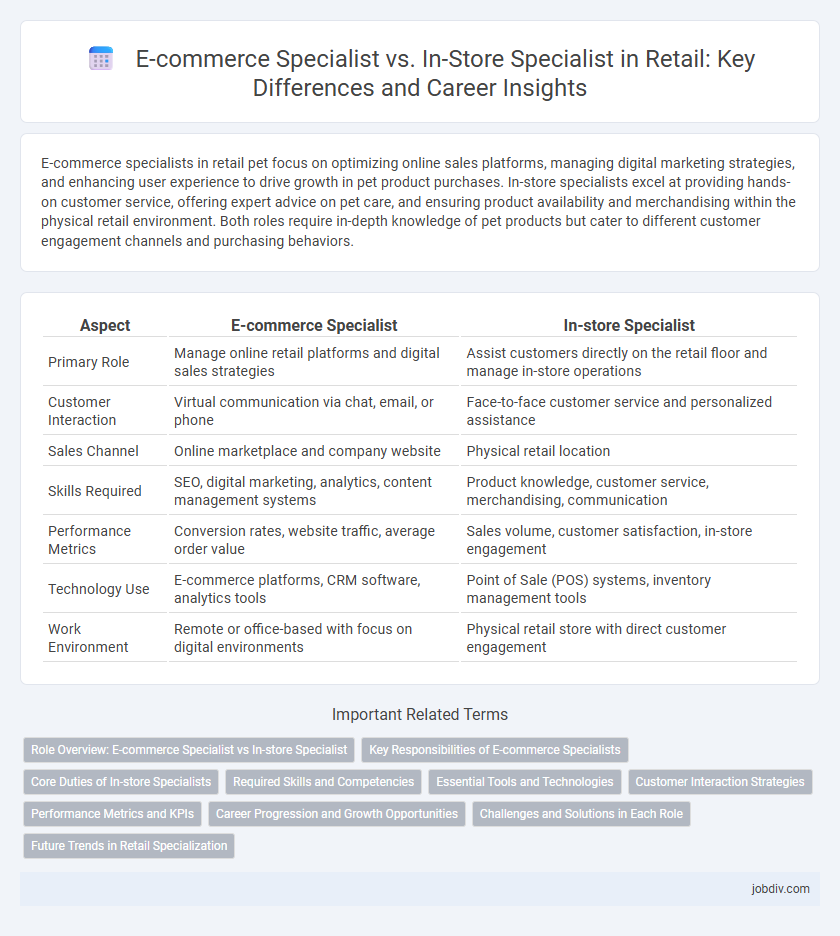E-commerce specialists in retail pet focus on optimizing online sales platforms, managing digital marketing strategies, and enhancing user experience to drive growth in pet product purchases. In-store specialists excel at providing hands-on customer service, offering expert advice on pet care, and ensuring product availability and merchandising within the physical retail environment. Both roles require in-depth knowledge of pet products but cater to different customer engagement channels and purchasing behaviors.
Table of Comparison
| Aspect | E-commerce Specialist | In-store Specialist |
|---|---|---|
| Primary Role | Manage online retail platforms and digital sales strategies | Assist customers directly on the retail floor and manage in-store operations |
| Customer Interaction | Virtual communication via chat, email, or phone | Face-to-face customer service and personalized assistance |
| Sales Channel | Online marketplace and company website | Physical retail location |
| Skills Required | SEO, digital marketing, analytics, content management systems | Product knowledge, customer service, merchandising, communication |
| Performance Metrics | Conversion rates, website traffic, average order value | Sales volume, customer satisfaction, in-store engagement |
| Technology Use | E-commerce platforms, CRM software, analytics tools | Point of Sale (POS) systems, inventory management tools |
| Work Environment | Remote or office-based with focus on digital environments | Physical retail store with direct customer engagement |
Role Overview: E-commerce Specialist vs In-store Specialist
An E-commerce Specialist manages online retail platforms, optimizing digital sales channels, customer experience, and data analytics to drive online revenue growth. In contrast, an In-store Specialist focuses on enhancing the physical shopping experience, including inventory management, visual merchandising, and personalized customer service. Both roles require deep product knowledge but differ in their approach to sales methodology and consumer engagement within digital versus brick-and-mortar environments.
Key Responsibilities of E-commerce Specialists
E-commerce Specialists manage online product listings, optimize digital marketing campaigns, and analyze web traffic data to enhance user experience and increase conversion rates. They oversee inventory management through integrated software, coordinate with logistics for timely order fulfillment, and implement SEO strategies to boost online visibility. Their role requires proficiency in data analytics, customer relationship management (CRM) tools, and staying updated with e-commerce trends to drive sales growth effectively.
Core Duties of In-store Specialists
In-store Specialists primarily focus on creating an engaging shopping environment, managing product displays, and providing personalized customer service to enhance the in-store experience. They handle inventory management, restocking shelves, and assisting customers with product information to drive immediate sales. Their role also involves coordinating with store management to implement promotions and ensure compliance with visual merchandising standards.
Required Skills and Competencies
E-commerce Specialists require strong digital marketing skills, proficiency in data analytics, and expertise in online customer experience optimization, while In-store Specialists excel in face-to-face customer service, inventory management, and visual merchandising. E-commerce roles demand competencies in SEO, content management systems, and multi-channel sales platforms, whereas in-store roles prioritize interpersonal communication, product knowledge, and store layout planning. Both positions require adaptability and problem-solving abilities but differ significantly in technical versus interpersonal skill sets essential for retail success.
Essential Tools and Technologies
E-commerce specialists rely heavily on advanced digital tools such as content management systems (CMS), customer relationship management (CRM) software, and analytics platforms like Google Analytics to optimize online sales and customer experience. In-store specialists prioritize point-of-sale (POS) systems, inventory management software, and customer engagement technologies like interactive kiosks to enhance physical store operations. Both roles utilize data-driven technologies but adapt them to their respective environments to improve efficiency and customer satisfaction.
Customer Interaction Strategies
E-commerce specialists leverage digital tools such as chatbots, personalized email campaigns, and social media engagement to create seamless, data-driven customer interactions that enhance online shopping experiences. In-store specialists prioritize face-to-face communication, product demonstrations, and sensory experiences to build trust and immediate rapport with customers. Combining data analytics with emotional intelligence allows both roles to tailor customer interaction strategies that boost satisfaction and drive sales.
Performance Metrics and KPIs
E-commerce Specialists prioritize metrics such as conversion rate, average order value, cart abandonment rate, and website traffic sources to optimize online sales performance. In-store Specialists focus on foot traffic, sales per square foot, average transaction value, and customer satisfaction scores to enhance the physical shopping experience. Both roles rely on data-driven KPIs to increase revenue, but E-commerce Specialists emphasize digital analytics while In-store Specialists concentrate on in-person engagement metrics.
Career Progression and Growth Opportunities
E-commerce specialists experience rapid career progression fueled by data-driven roles, digital marketing expertise, and growing demand for online retail skills, often advancing to roles like Digital Marketing Manager or E-commerce Director. In-store specialists develop deep customer service, visual merchandising, and inventory management abilities, with growth opportunities toward Store Management or Regional Retail Manager positions. Both career paths offer distinct growth trajectories, with e-commerce aligning with technological innovation and in-store roles emphasizing operational leadership and customer experience.
Challenges and Solutions in Each Role
E-commerce specialists face challenges such as managing online inventory accuracy, optimizing digital user experience, and handling cybersecurity threats, which require solutions like advanced inventory management systems, UX/UI enhancements, and robust cybersecurity protocols. In-store specialists confront issues like maintaining customer engagement, ensuring product availability, and managing physical space constraints, solved through personalized customer service training, real-time stock tracking, and efficient store layout planning. Both roles benefit from integrating data analytics to align inventory and sales strategies between online and offline channels.
Future Trends in Retail Specialization
E-commerce specialists are increasingly essential as retail shifts toward omnichannel strategies, leveraging data analytics, AI-driven personalization, and mobile commerce to enhance customer experience. In-store specialists focus on integrating digital tools like augmented reality and IoT to create interactive, immersive shopping environments that complement online efforts. Future retail success depends on seamless collaboration between e-commerce and in-store expertise, driving innovation through unified customer engagement and adaptive supply chain management.
E-commerce Specialist vs In-store Specialist Infographic

 jobdiv.com
jobdiv.com